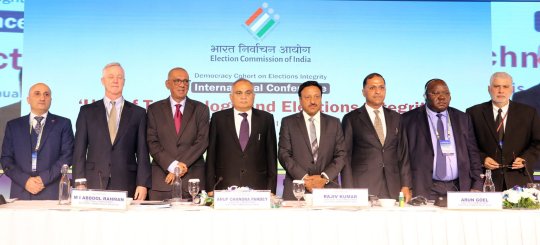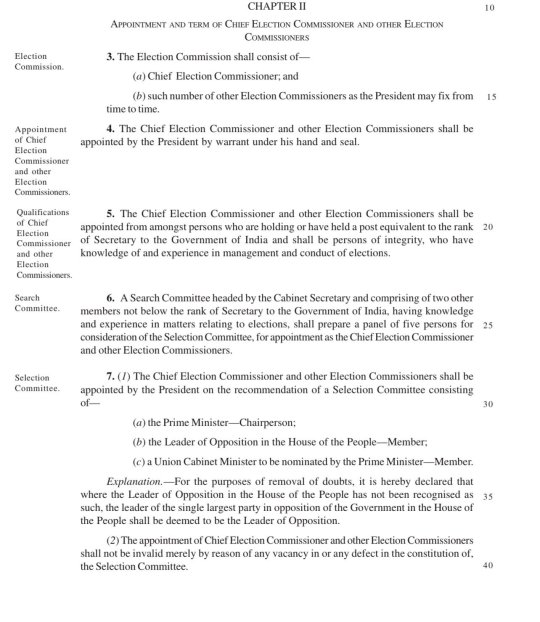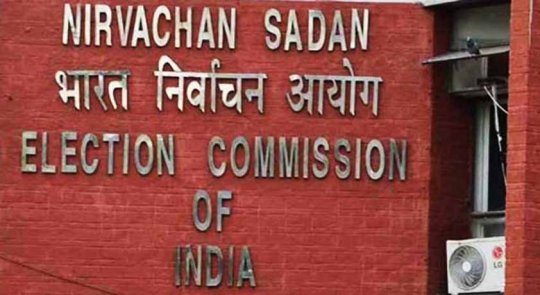#electioncommissionofindia
Text
https://satyamonlinesewa.openinapp.co/how-to-link-mobile #Satyamonlinesewa

SUBSCRIBE NOW
#Satyamonlinesewa#voter card#Electioncommissionofindia#Voterportal#technical yogi#tumbler#youtube#viral on social media#indianyoutuber#linkmobilenumber#mobile number link
2 notes
·
View notes
Text

ATTPL EMS Services | Seamless Election Management Solutions
We offer Election Management Services that empower political parties to enhance campaign promotion and gain deeper insights into their voter base. To Know More: https://attplems.com/
#élection#loksabha2024#loksabhaɛlections2024#modi#electioncampaign#digitalmarketing#bjp#electioncommissionofindia#electionresults#electionday
0 notes
Text

Travel to your constituency today to vote for a brighter future during the #GeneralElections.
Book air tickets on www.air.irctc.co.in or the #IRCTC #Air app and #FlyHomeToVote.
#GeneralElections2024#ChunavKaParv#DeshKaGarv#ECI#Elections2024#LokSabhaElections2024#airtickets#travel#electioncommission#election#elections#electioncommissionofindia#electionday#politics#vote#mayorelection#political#cheapflights#travelagent#tourism#flights#airfare#flighttickets#india#vacation#holidays#cheaptickets#travels
0 notes
Text
From Reforms to Results - The Power of Economic Policies in Steering India's Elections

Elections in India are a grand spectacle of democracy, characterized by vibrant campaigns, fervent public engagement, and, crucially, the influence of economic policies. The relationship between economic decisions made by ruling parties and their subsequent electoral outcomes is both complex and intriguing. As the 2024 India Poll is scheduled, we delve into how major economic policies have historically shaped the political landscape of India, influencing voter behavior and determining the fate of political parties.
For further reading please click on the link below :
https://maction.com/from-reforms-to-results-the-power-of-economic-policies-in-steering-indias-elections/
#electioncommission#election#elections#electioncommissionofindia#congress#news#narendramodi#electionresults#electionday#politics#india#mayor#bjp#rahulgandhi#vote#mayorelection#political#dailynews#soniagandhi#insta#amitshah#shashitharoor#result#yogi#telangana#rss#rajasthan#indian#nextpmrahulgandhi#patna
0 notes
Text
क्या होता है ‘NOTA’? चुनाव में NOTA को सबसे ज्यादा वोट मिले तो क्या होगा ?
#LokSabhaElections2024#LokSabhaElection2024#LoksabhaElection#LokSabha2024#loksabhapolls2024#Elections2024#ElectionCommissionOfIndia#NOTA#HindiNews#HCNNews
0 notes
Text
Election Commission of India (ECI) Issues Directives for Transparent and Inclusive Elections
0 notes
Link
0 notes
Text
Breaking News : Government Removes Chief Justice from Committee Selecting Chief Election Commissioner and Election Commissioner

In a move that has stirred significant debate and speculation, the government has announced its decision to remove the Chief Justice from the committee responsible for the selection of the Chief Election Commissioner (CEC) and the Election Commissioner (EC). This decision, which alters the composition of the committee responsible for these crucial appointments, has raised questions about the separation of powers and the implications for the independence of the electoral process.
The committee, which traditionally included the Chief Justice of India, played a vital role in ensuring a balanced and unbiased selection process for the top electoral posts in the country. By removing the Chief Justice from this committee, the government has triggered concerns about potential political influence in the appointment of officials who oversee the integrity of the democratic process.

Breaking News : Government Removes Chief Justice from Committee Selecting Chief Election Commissioner and Election Commissioner
While the exact rationale behind this decision has not been publicly disclosed, government representatives have indicated that the move is aimed at streamlining the appointment process and ensuring a more efficient decision-making mechanism. Critics, however, argue that this change could erode the checks and balances that have been in place to maintain the impartiality and autonomy of the Election Commission.
The Election Commission of India (ECI) is a constitutional body responsible for administering election processes in the country. It plays a critical role in ensuring free and fair elections and upholding the principles of democracy. The CEC and EC are key figures within the commission, and the transparency and credibility of their selection process are essential to maintain public trust in the electoral system.
The decision to alter the composition of the committee has sparked reactions from various quarters. Opposition parties, civil society organizations, and legal experts have expressed concerns about the potential consequences of this move on the independence of the Election Commission. They argue that the presence of the Chief Justice in the committee provided a necessary safeguard against undue political influence in the selection of election officials.
Proponents of the government's decision, on the other hand, suggest that this change could expedite the appointment process and bring in more diverse perspectives to the committee, thereby strengthening the selection process.

As the news of this decision spreads, it has become a topic of intense discussion, with many urging a careful review of the implications for the democratic process and the independence of the Election Commission. The government's commitment to transparency and the integrity of the electoral system will be closely monitored as this change takes effect.
The impact of this decision on the upcoming elections and the functioning of the Election Commission remains to be seen. It is essential for all stakeholders, including the government, opposition, and civil society, to engage in a constructive dialogue to ensure that the electoral process continues to uphold the democratic ideals and principles upon which the nation is founded.
Click for more updates and latest Trending news along with Entertainment updates. Also get latest news and top headlines from India and around the world at The Like News.
Read the full article
#Breakingnewsheadlines#ChiefJustice#ElectionCommission#ElectionCommissionofIndia#electoralsystem#IndianPrimeMinisterNarendraModi#ModiGovernment#Trending#UnionCabinetMinister#UnionHomeMinisterAmitShah
0 notes
Link
#BJP#Congress#defamationcase#ElectionCommissionofIndia#JaiBharatrally#KarnatakaAssemblypolls#LokSabha#PurneshModi#RahulGandhi#RahulGandhiJaiBharatrally#Suratdistrictcourt
0 notes
Text
#CBSELibrary#ElectionCommissionofIndiaEssay#ElectionCommissionofIndia#ElectionCommission#EssayWriting#LongEssayonElectionCommissionofIndia#ShortEssayonElectionCommissionofIndia#10LinesonElectionCommissionofIndia
0 notes
Text
ಭಾರತದ ಉನ್ನತ ಚುನಾವಣಾ ಅಧಿಕಾರಿಗಳ ನೇಮಕದಲ್ಲಿ ದೀರ್ಘಕಾಲದ ಪರಿಣಾಮ ಬೀರಬಹುದಾದ ಮಹತ್ವದ ಬದಲಾವಣೆ ತರುವ ಪ್ರಮುಖ ತೀರ್ಪನ್ನು ಸುಪ್ರೀಂಕೋರ್ಟ್ನ ಐವರು ಸದಸ್ಯ�� ಪೀಠ ನೀಡಿದೆ. ಪ್ರಸ್ತುತ ಈ ಉನ್ನತ ಸ್ಥಾನಗಳಿಗೆ ಸ್ವತಂತ್ರವಾಗಿ ಅಧಿಕಾರಿಗಳನ್ನು ನೇಮಿಸುವ ಹಕ್ಕು ಕೇಂದ್ರ ಸರ್ಕಾರದ ಬಳಿಯಿದೆ.
0 notes
Text

Smart Idea To Grow Your Business with E-prachar which is the Best Political Advertising Company In Delhi . so ,talk to us today !
#eprachar#politicaladvertisingcompany#bestelectioncompany#advertisingcompany#political#election2023#socialmedia#socialmediaadvertising#socialads#electionupdate#electionnews#electioninup#UttarPradesh#uttarchunav#socialmediamanager#electionsurvey#ElectionCommissionOfIndia#electionnews2023#prepollsurvey#electioncharcha#bestchunavpracharcompany#socialcampaign
0 notes
Text

#electioncampaign#election#elections#electionday#vote#india#electionresults#polticalcandidate#socialmediamarketing#indianpolitics#loksabhaelections#bjp#campaign#digitalmarketing#onlineelectioncampaign#onlineelection#electioncommissionofindia#business
0 notes
Text
State Election Commission: All You Need To Know

This article on 'State Election Commission: All You Need To Know' was written by Pooja Yadav, an intern at Legal Upanishad.
INTRODUCTION
The Election Commission in India is a permanent body and it is independent as established by the Constitution of India. The Election Commission was established with the aim of ensuring free and fair elections at the State or Central level. State Election Commission is a body of the Election Commission which ensures election at the State level. The composition of the Election commission is described under Article 324 of the Constitution of India.
Article 324 of the Indian Constitution says that Parliament, State Legislatures, President, and Vice President is having the power to supervise and took control of the Election Commission and they were also having the power to give direction to the Election Commission. Election Commission is an all-India body and its common to both the Central Government and State Government. This article attempts to explain the concept and laws governing the State election commission in India.
HISTORY OF ELECTION COMMISSION
Since its inception in 1950 and till 15th October 1989 the Election Commission would only consist of one member and that is only Chief Election Commissioner. It was only functioning as a single-member body. But on 16th October 1989, the President of India announced that, is going to appoint two more election commissioners so that the burden of the Chief Election Commissioner can be reduced and on 16th October 1989 the President appointed the other two election commissioners. This was done because of the increased work in the Election Commission due to lowering the voting age of the voters from 21 to 18 years.
After the appointment of the other two members by the President in the Election Commission, it was considered a multi-member body. But in 1990 the other two positions of Election Commissioner were abolished and again it was termed as the Single member body. But again, in October 1993 President appointed two more Election Commissioners as previously appointed by the President.
It was going on like a cricket match, out not out, out not out. But now it is not out since October 1993 till today it's same the Election Commission would consist of three members i.e. Chief Election Commissioner and other two Election Commissioners. Currently, the Election Commission of India is a multi-member body.
COMPOSITION OF ELECTION COMMISSION
Article 324 of the Indian Constitution provides for the composition of the Election Commission and it is as follows:
- The Election Commission shall consist of the Chief Election Commissioner and other such numbers of election commissioners as the President may fix from the time to time.
- The appointment of the Chief and other members of the Election Commissioner shall be made by the President of India.
- If any other Election Commissioner is appointed by the President then the Chief Election Commissioner would act as the Chairman of the Election Commission.
- The President is also having the power to appoint the Regional Commissioner if needed.
- If necessary than President may appoint Regional Commissioner after consulting with the Election Commission, to assist the Election Commission.
- President is the one who is responsible to decide and frame the service and tenure of the Election Commission.
STATE ELECTION COMMISSION
At the State level, all powers vested in the President are vested to the Governor of the State at the State level. State Election Commission would consist of State Election Commissioner who is appointed by the Governor and look into the Election Matters related at the State level not at the Central level. At the State level, the powers were in the hand of the Governor.
Article 243 k of the Indian Constitution talks about the elections to the Panchayats. Article 243 k gives the power of Superintendence, control, and direction of the Elections at Panchayat to the State Election commissioner in the State Election Commission who is appointed by the Governor. Here the Governor is having the power to determine the tenure and service o the office by the State Election Commissioner to the Commission.
The State Election Commissioner cannot be removed from the post on the grounds on which the Judge of the High Court is removed. It is different here. If State Election Commission needs some more staff for the work then State Election Commissioner may demand from the Governor the appointment of some more members in the Election Commission so that the workload can be reduced in the State Election Commission. It is mentioned under clause 2 of Article 243-k that it would become necessary for the Governor to make available such staff.
Now if we talk about elections in Municipalities so Article 243-ZA of the Indian Constitution talks about that. Article 243-ZA gives power to the State Election Commissioner in the State Election Commission with respect to the superintendence, direction, and control of the elections of Municipalities.
CONCLUSION
At the State level, the duty of the State Election Commissioner with respect to the superintendence and control and direction of the elections at the State level. For the appointment of the Election Commissioners at the State Election Commission Governor is the one who is responsible. At the Central level, the President of India is responsible for the appointment of an Election Commissioner. At the Central level and at the State level the Election Commission is a multi-member body.
The Chief Election Commissioner is the head of the Election Commission and the other two members were considered the members of the Election Commission. President is also having the power to appoint Regional Commissioner but can appoint them after consulting with the Election Commission to assist them in the work.
Whether it is the State level Election commission or it is central level Election Commission composition, the power and vision, and mission of the Election Commission are the same. The only difference is with respect to the power of appointment of the Chief Election Commissioner and other members of the Election Commission, at the state level the Governor is having the power of appointment and determining the service and tenure, and at the central level, the President is having the power with respect to the appointment and determining the tenure and service of the Commissioner and member.
References:
- State Election Commission’s Autonomy, Drishti IAS, 28 May 2020, available at: https://www.drishtiias.com/daily-updates/daily-news-editorials/state-election-commission-s-autonomy
- WHAT IS ELECTION COMMISSION OF INDIA (ECI)?, Business Standard, available at: https://www.business-standard.com/about/what-is-election-commission-of-india
- Supra note 1.
- “M. Laxmikanth, “Indian Polity”, “Chapter 42: Election Commissioner”, 6th ed.
- Ibid.
- Dr. J.N. Pandey, “Chapter: 28, Panchayats and Municipalities”, “The Constitution Of India”, p.625, 48th ed.
- Ibid.
Read the full article
1 note
·
View note
Text
The City and Village Vote - Cracking the Code on India's Urban-Rural Divide

As country readies 2024 India Poll Schedule for the massive General Elections, one key factor that political parties and analysts are keeping a close eye on is the difference in voting preferences between rural and urban areas. These two segments often have contrasting priorities, influences, and concerns that shape their voting choices in unique ways.
For further reading please click on the link below :
https://maction.com/the-city-and-village-vote-cracking-the-code-on-indias-urban-rural-divide/
#electioncommission#election#elections#electioncommissionofindia#congress#news#narendramodi#electionresults#electionday#politics#india#mayor#bjp#rahulgandhi#vote#mayorelection#political#dailynews#soniagandhi#insta#amitshah#shashitharoor#result#yogi#telangana#rss#rajasthan#indian#nextpmrahulgandhi#patna
0 notes
Text
बंगाल को लेकर इलेक्शन कमीशन लेगा बड़ा फैसला, चुनाव में आयोग उठायेगा ये कदम
#Bengal#Election2024#Elections2024#ElectionCommissionOfIndia#electioncommision#mamtabenrji#LokSabhaElections2024#LokSabhaElections#HindiNews#HCNNews
0 notes